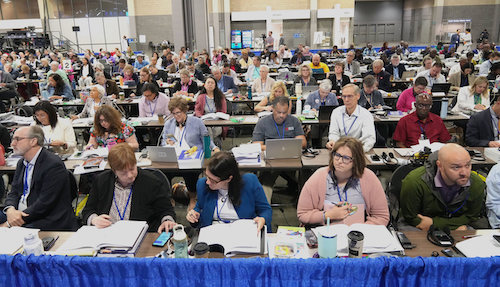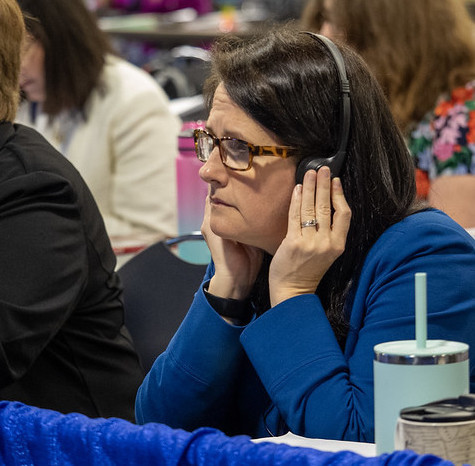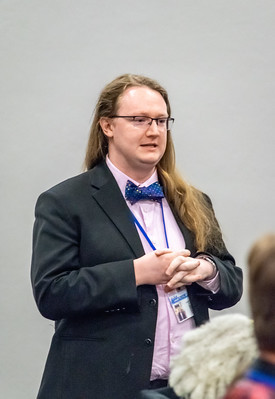
General Conference delegates share enthusiasm for worldwide regionalization
The United Methodist Church is on the cusp of having a new structure with more flexibility thanks to worldwide regionalization, which aims to give The United Methodist Church’s different geographic regions equal standing in decision-making.
The package of legislation that has become known as worldwide regionalization was developed collaboratively by United Methodists around the globe and adopted by 78% of General Conference delegates last year. Because worldwide regionalization requires a change to the United Methodist Constitution, it must now be be ratified by annual conferences to take effect. For ratification to occur, it needs the support of two-thirds of the total voting members of all United Methodist annual conferences combined. Dakotas United Methodists will vote on the ratification at our Annual Conference on June 6-8 in Mitchell, South Dakota.

GC 2024 delegates Dave Nuckols and Carol Zaagsma (MN), and Rebecca Trefz and Kara Heagel (Dakotas).
General Conference delegates from the Dakotas and Minnesota Conferences expressed enthusiasm for worldwide regionalization and the ways in which it will benefit the global church.
“I am hopeful and excited for what regionalization will bring to our denomination,” said Rev. Carol Zaagsma, the Minnesota Conference’s clergy delegate and assistant to the bishop for connectional ministries. “This legislation was overwhelmingly adopted by delegates of General Conference, and I do hope it will have enough support to be ratified now. I appreciate how regionalization will enable each region to create guidelines and make decisions that make most sense in their setting, while firmly retaining the things in common that make us United Methodist—The Constitution, Our Doctrinal Standards, Our Theological Task, The Ministry of All Christians, and The Social Principles.”
Since The United Methodist Church’s founding in 1968, the United Methodist constitution has allowed central conferences (regional administrative bodies outside of the United States) to reject or alter some items in The Book of Discipline to better fit their contexts. They have done this in a variety of ways. For example, some central conferences have developed their own hymnals, and others have developed their own worship resources. Central conferences have also altered General Conference-approved policies regarding the tenure of bishops.
Worldwide regionalization would give the United States that same authority to adapt portions of The Book of Discipline. The United States would become its own “regional conference,” as would the eight regions currently referred to as central conferences.
Zaagsma noted that many requirements in The Book of Discipline were created based upon a U.S. understanding of banking and property laws, but they make less sense in other parts of the world where practices differ. Regionalization will enable each region to attend to these details within their own context, which will bring more equity throughout our denomination for the sake of our mission.

Rev. Rebecca Trefz, Dakotas clergy delegate, listens to a translated speech during GC 2024.
Rev. Rebecca Trefz, the Dakotas Conference’s clergy delegate, agrees.
“One of the benefits I see is the better purpose, function, and stewardship of resources related to General Conference,” said Trefz, who also serves as the Dakotas’ assistant to the bishop for connection and communication. “Regionalization will allow us to focus on the main, core things that matter to all of us when we bring together delegates from around the world because region-specific matters can be handled in their regional context.”
Trefz notes that a one-size-fits-all model does not work for a global church that encompasses a variety of cultures and contexts—and worldwide regionalization will give United Methodists in the United States an opportunity to connect with siblings around the globe in new ways.
“I hope, in making the denomination less U.S.-centric, it will help us learn from other parts of the world and value them as equal partners,” she said.
Worldwide regionalization would allow regional conferences to adapt portions of The Book of Discipline, giving each one authority to set standards in the following areas as part of its own regional Book of Discipline:
• minimum qualifications and educational requirements to ordain, commission, and license clergy within their bounds
• minimum qualifications and educational requirements for specialized lay ministries within their bounds
• criteria to determine whether persons qualify for professing membership in The United Methodist Church within their bounds, and set expected standards of character and conduct for persons to be continued as professing members
• organization of the regional, annual, district, and charge conferences
• hymnal and ritual—including rights for marriage and burial
• judicial administration related to questions arising from new or adapted sections of the regional Book of Discipline and processes for the investigation and trial of clergy and laity when there are formal complaints
Dakotas lay delegate Kara Heagel said she learned at last year’s General Conference that some Central Conference delegates arrived early to learn about the U.S.-specific legislation they’d be voting on—legislation like insurance, pensions, and other benefits that had no impact on them.
“The main benefit I see of regionalization is that it allows the General Conference to operate on a more worldwide level and focus on worldwide issues,” she said. “Regionalization really allows the United States to…have legislation that is specific to the United States.”

Minnesota delegate Walker Brault at GC 2024.
Minnesota alternate lay delegate Walker Brault echoed that sentiment.
“Regionalization is an effort to decolonize our denomination by helping us move from a U.S.-centered church with branches adapted to their context to a truly global church with equity across our different regions while remaining focused around the core of United Methodism,” he said. “Regionalization sets a more equal playing field for our global conversations about our church while also freeing up time, energy, and resources spent at General Conference on business that relates solely to the United States.”
He sees benefits for United Methodists in other parts of the world and for United Methodists in both the United States and the Dakotas-Minnesota Area.
“The greatest impact we might see…might be found in making it easier to develop and approve alternative structures and modes of operation for our local churches, districts, and annual conference to better adapt to our rapidly and ever-changing world,” he said.
Additional resources related to worldwide regionalization:
• Webinar
• One-page explainer
• Slide deck for U.S. annual conferences
• Article series: What is regionalization?